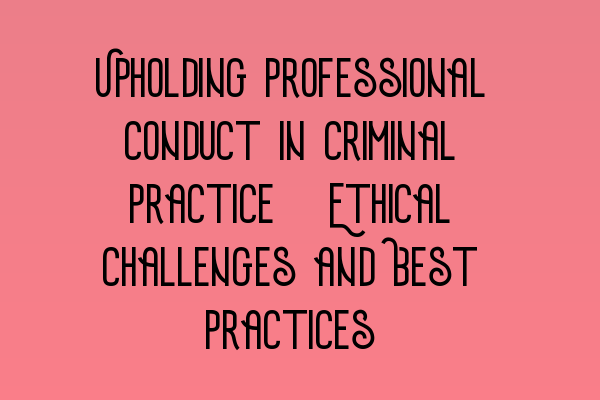Upholding Professional Conduct in Criminal Practice: Ethical Challenges and Best Practices
Welcome to SQE Criminal Law & Practice Law UK, where we take pride in providing comprehensive guidance and support to aspiring criminal law professionals. Today, we delve into the crucial topic of upholding professional conduct in criminal practice, exploring the ethical challenges faced by legal practitioners and offering best practices to maintain the highest standards of professionalism.
As criminal law practitioners, it is not uncommon to encounter ethical dilemmas, especially when representing clients in complex cases. These challenges highlight the importance of adhering to a strong code of professional conduct, which serves as the bedrock of a successful legal career.
Understanding Ethical Challenges in Criminal Practice
Working in the field of criminal law exposes professionals to various ethical challenges, ranging from issues of client confidentiality to conflicts of interest. Let’s discuss some common scenarios where maintaining professional conduct becomes paramount.
Conflict of Interest: Criminal cases often involve multiple defendants, each with their own legal representation. As a criminal law practitioner, it is crucial to recognize and address potential conflicts of interest, ensuring that your duty to act in the best interests of your client is never compromised.
Client Confidentiality: Upholding the attorney-client privilege is vital in criminal practice. Clients must trust that the information they share with you will remain confidential. It is your ethical duty to safeguard this trust and ensure the privacy of sensitive information.
Zealous Advocacy: While it is essential to vigorously defend your client’s interests, it is equally important to remain ethical in your approach. Upholding the principles of fairness and justice should guide your advocacy, ensuring that it does not cross ethical boundaries.
Dealing with Uncooperative Clients: In some cases, clients may exhibit challenging behavior or refuse to cooperate fully. It is crucial to handle such situations ethically, balancing your duty to represent your client’s interests with your professional responsibilities.
Best Practices for Upholding Professional Conduct
Now that we have explored some common ethical challenges, it’s time to delve into the best practices for upholding professional conduct in criminal practice. These practices will not only help you maintain a strong ethical footing but also enhance your reputation as a trusted legal professional.
Continued Professional Development: Stay updated with the latest developments in criminal law by attending workshops and seminars. Our article on Workshops and Seminars on Criminal Practice: Expanding Your Expertise provides invaluable insights into expanding your knowledge and honing your skills.
Stay Informed: In a constantly evolving legal landscape, staying informed about updates in UK criminal laws is vital. Our article on Updates in UK Criminal Laws: Staying Informed and Prepared offers a detailed analysis of the latest changes and provides tips on staying ahead.
Collaborate & Engage: Enhance your SQE criminal law study group experience by actively collaborating with fellow aspiring legal professionals. Our article on Enhancing Your SQE Criminal Law Study Group Experience offers insights on effective collaboration and engagement strategies.
Conduct Thorough Case Analysis: Decoding criminal evidence rules is a crucial aspect of ethical criminal practice. Our article on Decoding Criminal Evidence Rules: A Detailed Analysis provides a comprehensive overview, empowering you to navigate this complex area with confidence.
Combatting Fraud and Financial Crimes: Fraud and financial crimes pose unique challenges in criminal practice. Delve into this topic with our article on Deep Dive into Fraud and Financial Crimes in the UK, equipping yourself with the knowledge to effectively address these issues while upholding professional conduct.
Conclusion
Upholding professional conduct in criminal practice is a responsibility that every legal practitioner must embrace. By understanding the ethical challenges and implementing best practices, you can navigate your career with integrity and build a reputation as a trusted advocate of justice.
At SQE Criminal Law & Practice Law UK, we are committed to supporting your journey towards professional excellence. Stay tuned for more informative articles and resources to enhance your criminal law expertise.
